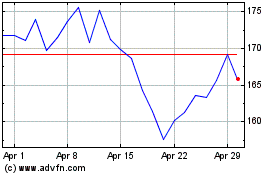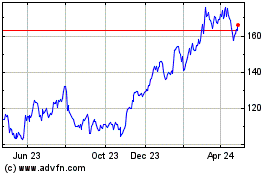FTC Request to Reconsider Qualcomm Antitrust Case Rejected by Appeals Court -- Update
October 28 2020 - 6:02PM
Dow Jones News
By Brent Kendall
A federal appeals court on Wednesday refused to reconsider its
decision earlier this year to throw out a government antitrust case
against Qualcomm Inc.
The Federal Trade Commission had alleged the dominant cellphone
chip maker engaged in illegal monopolization, but a three-judge
panel on the Ninth U.S. Circuit Court of Appeals ruled in August
that the government hadn't proven its case.
The circuit said the FTC hadn't demonstrated that Qualcomm's
core business practices related to its cellphone chips and patents
were anything more than lawful attempts at profit maximization.
The FTC asked the Ninth Circuit to rehear the case with more
judges participating. The court denied that request Wednesday
without comment on the case, a move that deals a stinging and
near-final blow to the commission's case. The appeals court
indicated that no judge called for a vote on the FTC's request to
reconsider.
The FTC's lawsuit, filed at the end of the Obama administration,
alleged that San Diego-based Qualcomm held monopolies in two types
of must-have modem chips and wouldn't sell them to device makers
unless those companies also paid to license a broader portfolio of
Qualcomm's intellectual property. That structure made it difficult
for phone makers to challenge Qualcomm's patent royalty rates, and
the arrangement also meant those manufacturers were paying Qualcomm
royalties even if they used a competitor's chips in their phones,
the FTC alleged.
Qualcomm said it acquired its market position through ingenuity
and argued that its licensing practices were fair and sensible
because every cellphone invariably uses its patented technologies.
In an unusual government split, the Justice Department under Trump
administration leadership supported Qualcomm in the case, arguing
against the FTC, with which it shares antitrust enforcement
powers.
The FTC won a sweeping antitrust judgment from a trial judge
last year that ordered changes to Qualcomm's business practices,
but on appeal the Ninth Circuit panel this summer wiped out that
ruling, saying it was deeply flawed.
""The fact that not one judge on the Ninth Circuit thought it
necessary to consider the merits of the FTC's petition or to even
ask for a response from Qualcomm validates the strength and clarity
of the panel's thorough analysis and conclusions," the company said
in a statement.
The FTC declined to comment.
The ease of the Ninth Circuit's rejection came as something of a
surprise because dozens of antitrust scholars, as well as several
companies including smaller tech firms and auto makers, had filed
amicus briefs urging the appeals court to reconsider.
The commission's only remaining option would be to seek review
from the Supreme Court, a request that could face long odds.
Asa Fitch contributed to this article.
Write to Brent Kendall at brent.kendall@wsj.com
(END) Dow Jones Newswires
October 28, 2020 17:47 ET (21:47 GMT)
Copyright (c) 2020 Dow Jones & Company, Inc.
QUALCOMM (NASDAQ:QCOM)
Historical Stock Chart
From Mar 2024 to Apr 2024

QUALCOMM (NASDAQ:QCOM)
Historical Stock Chart
From Apr 2023 to Apr 2024
